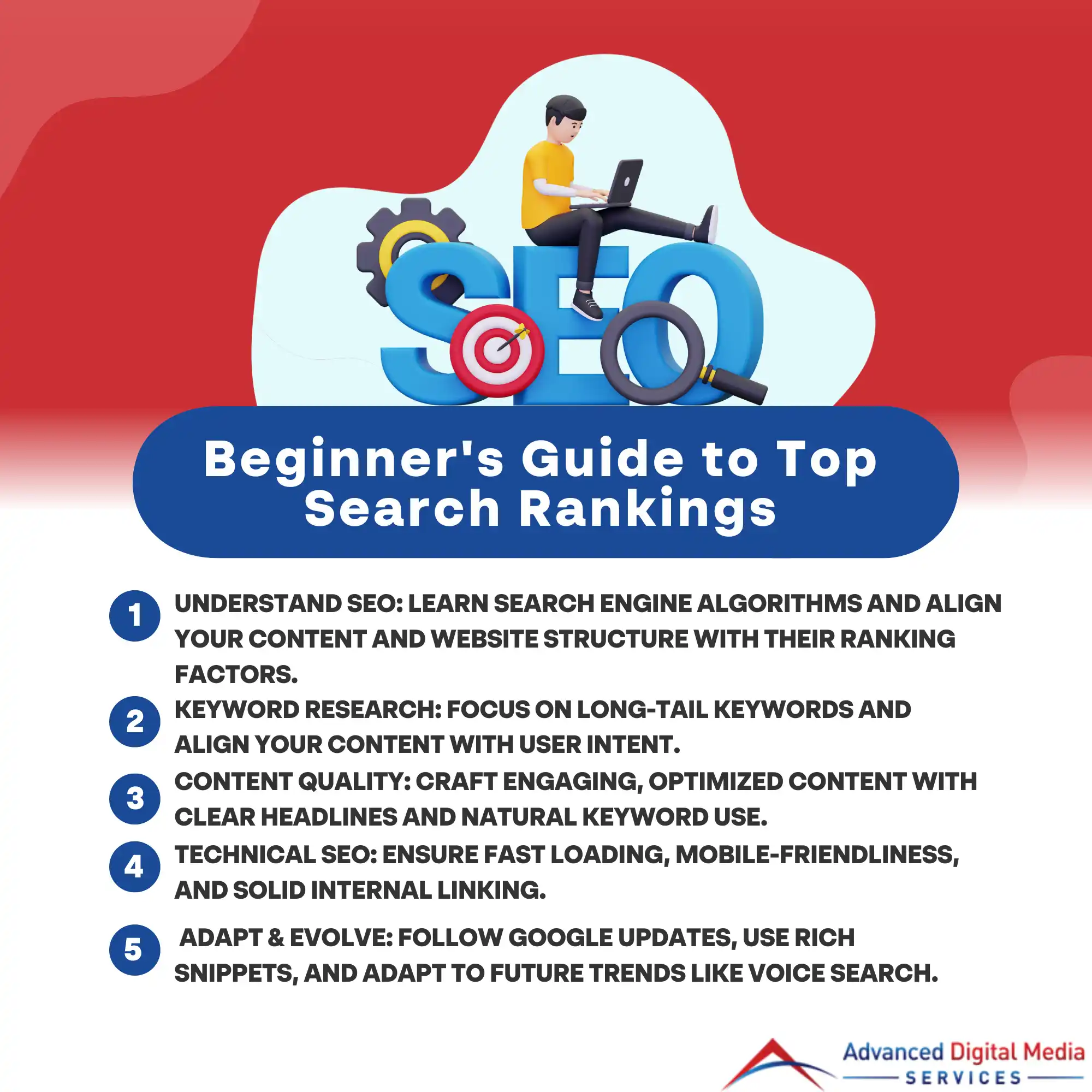The Secrets of Top Search Rankings
Have you ever typed a question into Google and felt lost in a sea of irrelevant results? Meanwhile, some websites seem to magically appear at the top, attracting all the clicks and attention. What’s their secret? The solution to boosting website visibility is through Search Engine Optimization (SEO). In this beginner’s guide, we’ll crack the code and unlock the secrets to climbing the search engine ladder and achieving top search rankings.
Why Should You Care About Search Rankings?
Envision your website as a bustling street’s storefront. Top search rankings position your website in prime real estate, where floods of potential customers can discover it. Here’s why you should strive for those coveted spots:
- Unleashing a Flood of Website Traffic: If search engines can’t find your website, it’s like having a hidden storefront. SEO makes your website discoverable, driving more visitors your way and boosting your online presence.
- Attracting New Customers and Boosting Sales: Increased website traffic translates to more potential customers. Ranking for relevant searches connects you with potential customers actively searching for your products/services.
- Building Brand Awareness and Credibility: Top search rankings position your brand as a leader in your industry. It builds trust and credibility, making you a go-to resource and establishing your brand as a force to be reckoned with.
What is SEO and How Does it Work?
Search engines like Google are complex machines that constantly crawl websites, analyze their content, and determine their relevance to search queries. Here’s a simplified breakdown:
- Understanding Search Engines: Google’s sophisticated algorithms deliver the most relevant search results by understanding user intent.
- Understanding Search Algorithms: SEO improves website ranking potential by aligning it with search engine algorithms.
- Ranking Factors: Content quality, website structure, backlinks, and user experience are just a few of the many factors that influence search rankings.
Keyword Research: The Foundation of SEO
Before you build an SEO strategy, you need to understand what people are searching for. Performing keyword research is the fundamental step in ensuring a successful SEO campaign. Here’s how to get started:
- Uncovering the Keywords People Actually Search For: Powerful keyword research tools like Google Keyword Planner help you identify the terms and phrases people use to find information online.
- Long-Tail Keywords: Unlocking Hidden Traffic Potential: Don’t just focus on broad, high-competition keywords. Long-tail keywords can drive more targeted traffic and are easier to rank for due to their specificity and lower search volume.
- Analyzing Search Intent: It is essential to comprehend the intention behind a search query. Are people looking for information, trying to buy a product, or something else entirely? Tailor your content to fulfill your audience’s needs and provide the sought-after information.
How to Learn SEO: Creating SEO-Friendly Content
Now that you know what people are searching for, it’s time to create content that attracts them. But it’s not just about churning out words. Here’s how to craft content that resonates with search engines and users alike:
- Crafting Content that Search Engines and Users Love: High-quality content is the cornerstone of SEO. It should be informative, engaging, and valuable to your target audience. Search engines reward websites with content that keeps users coming back for more.
- Titles and Headlines: Your titles and headlines are the first impressions your content makes. Make them clear, concise, keyword-rich, and intriguing to grab attention and encourage clicks.
- Structuring for Readability: To improve readability and user experience, break up content using subheadings, bullet points, and images.
- Keyword Integration: The Art of Natural Keyword Use: Keywords are essential, but don’t stuff them in unnaturally. Integrate them seamlessly throughout your content to signal relevance to search engines, but prioritize creating content that flows naturally and is enjoyable to read.
The Power of High-Quality Content
Great content is more than just a tool for ranking higher. It’s the foundation for building trust and establishing yourself as an authority in your field. Here’s how high-quality content empowers your SEO efforts:
- User Engagement & Dwell Time: Engaging content leads to more extended user visits, which positively affects search rankings.
- Building Topical Authority: Consistently creating high-quality content on a specific topic demonstrates your expertise and positions you as a thought leader in your industry.
- Becoming a Trusted Resource: To become a trusted resource in your niche, provide valuable insights and solutions to your audience. This not only strengthens your SEO but also fosters brand loyalty and encourages conversions.
Technical SEO: Building a Strong Foundation
Before you dive into content creation, make sure your website is technically sound. Technical SEO ensures search engines can easily find, crawl, and index your website. Here are some key areas to focus on:
- Making Your Website Discoverable: Website Crawlability and Indexing: Search engines need to access and understand your website’s content. Use robots.txt and sitemap files to guide search engine crawlers and ensure they can efficiently index your web pages.
- Website Speed Optimization: The Importance of Blazing-Fast Load Times: Optimize website speed to avoid frustrating users and hurting SEO.
- Mobile-Friendly Design: Catering to the Mobile-First World: Responsive web design is essential for mobile users. Not only will it improve user experience, but Google will also prioritize mobile-friendly websites in search results.

SEO Guide for Beginners: Sending the Right Signals
On-page optimization involves optimizing the individual elements on each webpage to improve its ranking potential. Here’s how to send the right signals to search engines:
- Optimizing Title Tags, Meta Descriptions, and Headings: Craft effective title tags and meta descriptions using relevant keywords to entice clicks and accurately represent your content. Use headings (H1, H2, etc.) to structure your content and improve readability.
- Internal Linking: Building a Strong Website Architecture: Strategic internal linking connects your web pages, helps search engines understand your website structure, and improves user navigation. Creating a user-friendly and informative website experience can be achieved by using relevant anchor text to link to related pages on your website.
The Link-Building Game: Earning Backlinks and Authority
Backlinks, or links from other websites to yours, are a crucial factor in SEO. Search engines consider backlinks as a valuable and trustworthy endorsement for your website. Here’s how to build a strong backlink profile:
- Why Backlinks Matter and How to Get Them: Earning backlinks from high-quality, relevant websites significantly boosts your SEO authority. Guest blogging, creating link-worthy content that others want to share, and building relationships with other websites in your niche are some ways to acquire backlinks organically.
- The Importance of High-Quality Backlinks: Building Trust and Authority: Not all backlinks are created equal. Prioritize getting backlinks from reputable industry websites. Avoid spammy tactics that can hurt your SEO standing and damage your website’s credibility.
Beyond the Basics: Advanced SEO Techniques
SEO is a constantly evolving field. Once you’ve mastered the fundamentals, explore these advanced techniques to optimize your website further:
- Schema Markup: Rich Snippets for Higher Visibility: Schema markup is code added to websites, helping search engines better understand their content. This can lead to more prosperous snippets in search results, improving click-through rates and attracting more qualified traffic.
- Local SEO: Optimizing for Your Neighborhood: If you have a local business, local SEO is essential. Optimize your local search results by managing your Google Business Profile listing, encouraging reviews, and targeting location-specific keywords.
Measuring Your Success: Tracking SEO Performance
SEO is a marathon, not a sprint. To monitor your advancement and recognize areas that require enhancement, it is essential to have the appropriate set of tools:
- Essential SEO Tracking Tools: Utilize tools like Google Search Console to monitor website health, track keyword rankings, and identify potential SEO issues.
- Analytics Tools for Monitoring Traffic: You can utilize Google Analytics to examine your website traffic, user conduct, and the efficacy of your SEO tactics.
- Keyword Ranking Trackers: Keep an eye on your keyword rankings over time to see how your SEO efforts are impacting your visibility in search results.
Best Way to Learn SEO: Analyze Results and Make Adjustments
Once you have data, it’s time to analyze it. Here’s what to do:
- Understanding Key SEO Metrics: Measure your SEO strategy’s effectiveness by analyzing organic traffic, bounce rate, and conversion rate.
- Identifying Areas for Improvement: Analyze your data to identify areas where your SEO can be improved. This could be anything from optimizing specific pages for relevant keywords to building backlinks from high-authority websites.
- Continuously Optimizing Your Website: SEO is an ongoing process. Monitor performance, adjust strategy, and stay updated with SEO trends to remain competitive in search results.
Staying Ahead of the Curve: SEO Updates
The SEO landscape is constantly evolving. Here’s how to stay ahead of the game:
- Keeping Up with Google Algorithm Changes: Google regularly updates its algorithms, so staying informed about these changes is crucial. Follow industry publications, attend SEO conferences, and subscribe to reputable SEO blogs to stay updated on the latest developments.
- Core Web Vitals and Mobile-First Indexing: Google favors websites that offer fast loading times and mobile-friendliness, prioritizing good user experience. Keep these factors in mind when optimizing your website, focusing on Core Web Vitals to ensure a smooth user experience across all devices.
- Evolving Your SEO Strategy: As search engines and user behavior change, your SEO strategy should adapt as well. Be flexible and willing to experiment with new techniques, such as voice search optimization and creating content that caters to the ever-growing mobile audience.
Future-Proofing Your SEO Efforts
The key to effective search in the future is understanding user intent and providing highly relevant results. Here’s how to keep your SEO strategy future-proof:
- The Rise of Voice Search: To optimize your website for voice search, it’s essential to use a conversational tone and incorporate long-tail keywords.
- The Growing Importance of Artificial Intelligence: Search algorithms are increasingly dependent on artificial intelligence. Focus on creating high-quality, informative content that caters to users’ needs and incorporates rich media elements like videos and images to enhance user engagement.
- Embracing the Future of Search: Stay curious and experiment with new trends as they emerge. The SEO landscape is constantly evolving, and remaining adaptable is crucial for maintaining an effective strategy in the long term.
Conclusion
The journey to top search rankings requires dedication and ongoing effort. To achieve success in SEO, follow the strategies that are mentioned in this guide. SEO requires patience, high-quality content, and continuous optimization to improve rankings and attract traffic.
Unleash the Power of SEO: Get a Free SEO Consultation Today!
Even after mastering the SEO fundamentals, you might require additional help to stay ahead of the curve. Advanced Digital Media Services, the leading agency for SEO services in Tamarac, FL, can provide expert assistance. We offer custom SEO strategies to optimize your website, build high-quality backlinks, and adapt to the latest search algorithms. Let Advanced Digital Media Services help you achieve your online marketing goals by dominating search results. Contact us today to learn more about our SEO services in Tamarac, FL.





